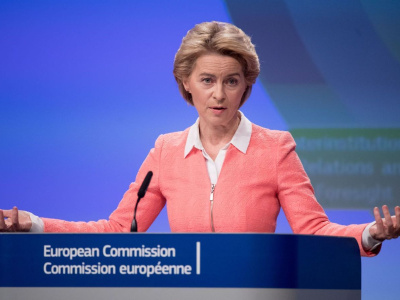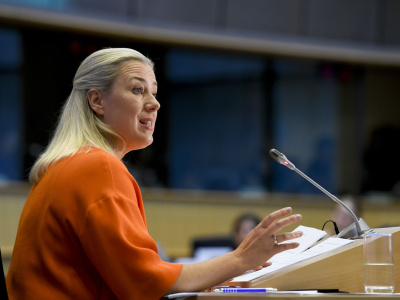
Geopolitics for dummies: Big challenges await the new European Commission
“Countries from East to West, from South to North, need Europe to be a true partner. We can be the shapers of a better global order. This is Europe’s vocation. And it’s what European citizens want.” This was the ambitious and somewhat ambiguous language with which Ursula von der Leyen laid out her vision for Europe in the world to the European Parliament on 27 November, when the Parliament confirmed her new “geopolitical” Commission.
Yet, even before von der Leyen took office, the credibility of the EU as a geopolitical player was once more called into question by the EU’s lack of unity with regard to how it interacts with its closest neighbours. At the same time, a more geopolitically aware EU will need to tread carefully to avoid stirring up unwelcome memories in certain parts of the world, most notably Africa. Ursula von der Leyen will need to keep this in mind this week when she departs to Addis Ababa on her first trip outside Europe as European Commission president.
Geopolitical weakness
Ultimately, the biggest challenge facing the new Commission in its aim to be a real geopolitical player remains the lack of European unity in the face of major political challenges in its immediate neighbourhood. This was made abundantly clear by the French veto on opening North Macedonian accession talks, which arguably undermines the EU’s geopolitical role in the Western Balkans and leaves the region open to greater influence from Russia, China, Turkey and the Gulf. It was further manifested by the lack of a strong unified European response following Turkey’s incursion into Syria, once again leaving the EU on the sidelines in conversations about the future of Syria.
These incidents reinforce the idea that the EU is unable to act as a united geopolitical actor in those regions closest to home, where it ought to have the most influence. They also reinforce fears that the EU will simply be asked to pick up the bill for reconstruction in Syria without playing any role in the political settlement there.
The same is often true in much of Africa, where former European colonial powers rather than the EU as a whole have traditionally been the major players, while the EU has financed development initiatives or preached on human rights and democracy with diminishing success.
Given Europe’s weakness in its immediate neighbourhood, this poses questions regarding the von der Leyen Commission’s ambitious aims for developing a new strategic partnership with Africa, which myself and Andrew Sherriff explored recently. Von der Leyen’s initial trip to Addis Ababa is of great symbolic importance, showing a true commitment to raising the profile of the EU relationship with the African Union and with African governments. But von der Leyen will require real buy-in from EU member states if she is to transform the relationship.
Strategic autonomy… Doable and desirable?
Building a European Defence Union (EDU) is one of the main priorities of the von der Leyen Commission, highlighted as a priority in the mission letters of new EU foreign policy chief Josep Borrell and of internal market commissioner Thierry Breton.
There is growing consensus in European policy circles around the need to strengthen European defence capabilities, to build economies of scale within the EU, and to improve interoperability between European militaries. Efforts in this area continue to slowly advance, as evidenced by the signing of 13 new defence projects launched under PESCO, the permanent framework for defence cooperation, on 12 November.
Yet, the pursuit of European strategic autonomy raises as many questions as it answers; regarding common European ambitions in the area; but also about where Europe is most likely to project its future military power.
Most widely discussed is the question of whether France and Germany will be able to develop a common strategic outlook and shared ambitions – particularly in the fallout after Macron’s comments about NATO being “brain dead”. The chasm between French and German ambitions was already evident long before that, notably in France’s championing of the more ambitious European Intervention Initiative, a ten-country project outside the European treaties that includes the UK and Norway, and aims to bring the “strategic culture” of European countries closer together.
Thus even as the EDU advances, differences in strategic outlook, that have in the past hampered a common European approach to crises in its neighbourhood and Africa, look likely to continue.
Less discussed is the question of how a more robust European military actor might be viewed beyond the EU’s borders. For many in Africa, a militarily stronger Europe would not necessarily be welcomed nor seen as a positive development, particularly if this comes at the expense of the civilian assets that the EU deploys. Furthermore, the EU’s turn towards realpolitik has been accompanied by growing tensions about how the EU integrates human rights and democracy into its foreign policy.
Von der Leyen does not mention human rights or democracy once in relation to foreign policy in her political guidelines, her 27 November speech to the European Parliament, or her mission letters to external-facing commissioners. This may be welcomed by many partner governments tired of being lectured by the EU, but does not bode well for human rights defenders and civic movements around the world, who struggle to find support.
Economic sovereignty and new partnerships
In her mission letters to the various commissioners holding important economic portfolios, von der Leyen has also laid out an ambitious agenda for the European Union to build on its strength as a global economic actor and develop its economic sovereignty. This comes against a backdrop of the US retreating from its traditional role as protector of the international rules-based order, now quite often attacking it – and by extension European interests – in the trade realm.
It was on trade policy that the EU ultimately had its greatest global success in recent weeks, with incoming trade commissioner Phil Hogan accompanying Macron to China where Hogan signed an important agreement with China to protect one hundred European geographical indications (GIs) in China and one hundred Chinese GIs in the EU.
This deal aims to protect well-known European products like champagne and feta against imitations. The deal had been in the making for many years by the Juncker Commission, but it provided a strong start for Phil Hogan in his new position as trade commissioner, highlighting the kind of flexible economic agreements that the new Commission hopes to pursue in its relations with other major powers going forward.
What is perhaps most innovative at the outset of the von der Leyen Commission is the attempt to break down the silos between European (economic) policies, so as to make European policy-making less fragmented. She highlights both the overlaps between portfolios and the linkages between domestic and international policy in each portfolio.
Operationalising this so that the EU is able to deploy all its economic tools in a coherent manner internationally will be a more complicated task and one that may need to be pushed through in the face of much internal bureaucratic resistance. As other global powers develop new cooperation models, look to solidify access to resources and establish new trade channels, the EU will increasingly need to strike more flexible arrangements for trade and investment.
In Africa, this means the EU will need to develop a more compelling narrative about how it hopes to work with African countries on trade and investment, avoiding some of the mistakes of the past regarding trade, and developing clear evidence to support the development claims of investment initiatives.
Required: realism and a little humility
While there is a clear momentum for positioning the EU more firmly on the global stage, in the current political context this is a vulnerable ambition. Despite the apparent enthusiasm of certain significant member states, recent events demonstrate that these states will continue to work in their own self-interest and fail to empower the institutions when there are major geopolitical decisions on the table.
Further, the European Commission’s ability to act as a real geopolitical actor will to a large extent depend on the current negotiations around the new Multiannual Financial Framework. A smaller budget and fragmented financial framework would significantly hamper ambitions, but this is where negotiations might end up.
At the same time, if the new “geopolitical” Commission truly wants to be a good partner to countries around the world, and particularly to its neighbours in Eastern Europe, the Levant and Africa, it will need to ensure that the first order of business is to listen and learn from its partners.
Von der Leyen and her team should not assume that greater European power projection will be welcomed by its neighbours, particularly if not accompanied by a clearer strategic vision for working hand in hand with partners on issues of concern to them, rather than just pushing for a European agenda.
This means transforming the relationship with Africa into one based on real interests and values across a wide range of areas, including security, investment and trade, climate, environment and energy, mobility and migration, and research and innovation. Von der Leyen’s initial trip to Addis Ababa on 7 December provides the perfect opportunity to listen and learn from partners and to begin working together to shape this new relationship.
The views are those of the author and not necessarily those of ECDPM.




